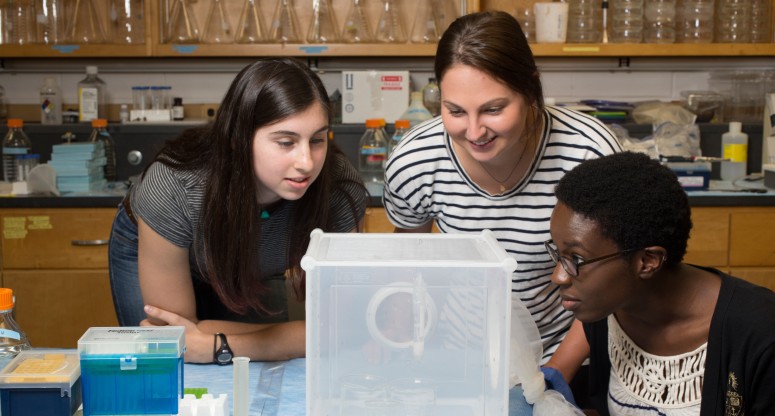Insect Investigators

From Kenyon News - August 1, 2016
Spot a stray mosquito buzzing around Higley Hall? Odds are it came from Professor of Biology Chris Gillen’s lab.
Gillen and three of his students — Taylor Jamil ’17, Grace Riley ’18 and Kenny Viel ’17 — are hard at work this summer researching how mosquitoes regulate the balance of salt in their small bodies. Mosquitoes face the unique challenge of managing large fluctuations in their salt levels, especially after female mosquitoes indulge in a blood meal. Gillen and his students are examining three particular proteins that help carry salts in and out of the insects to regulate this delicate balance.
Their research could one day provide insight for the development of new types of insecticides to control mosquito populations that are highly targeted to a specific species.
“One of the big problems with any approach is you need to find something that kills mosquitoes and not everything else,” Gillen said.
Gillen’s research, which continues year-round, is supported by a $150,000 grant from the National Science Foundation. The grant helps fund stipends for student research and is split between Gillen and his collaborator, Peter Piermarini from the Ohio Agricultural Research and Development Center in Wooster, Ohio.
The summer research conducted by Jamil, Riley and Viel is supported by Kenyon’s Summer Science Scholars program, which helps budding scientists gain valuable research experience by partnering them with faculty members on research projects. This summer’s 37 scholars each received a $3,500 stipend plus on-campus housing.
“It’s easier to come into the lab into the summer,” said Viel, a molecular biology major and anthropology minor with an African diaspora studies concentration from Chandler, Arizona. “I have a lot more time to focus. It’s been really nice to not have to rush myself. I can spread my work across the whole day.”
As part of their work as Science Scholars, Jamil, Riley and Viel have individual research focuses. Jamil, a molecular biology and Spanish double major from Libertyville, Illinois, is focusing on the gene expression among the three proteins and how the proteins’ prevalence differs between adult mosquitoes and larvae. Riley, a molecular biology major from La Crosse, Wisconsin, is examining precisely where the proteins are located in the mosquitoes’ bodies. Viel is studying how the proteins appear in blood-fed versus sugar-fed adult female mosquitoes.
The students have bred thousands of their own mosquitoes to dissect for their research with the goal of getting tissue samples from the mosquitoes’ kidneys, which offer key insights into the salt levels of the insects. The key to taking apart the tiny creatures? Extremely sharp tweezers.
“Once you know what you’re looking for and once you find the right tweezers that work really well for you, it’s just kind of like putting on headphones and going,” Viel said.
In addition to breeding and dissecting mosquitoes, Summer Science Scholars gain valuable time with their faculty mentors outside of the classroom, especially at their weekly “bologna loaf” lunches, a tradition that originated with the program in the 1980s.
“You get really close with your professors,” Jamil said. “It helps you in the long run. I don’t think you get that opportunity at bigger schools.”
The close collaboration built during the summer months also helps students and faculty members propel research throughout the school year. Jamil, Riley and Viel will continue to work with Gillen on his research in the fall semester.
“We prepare during the prior spring semester so that we can hit the ground running in the summer, then use the fall semester to extend our work,” Gillen said. “When there’s a group of students like this, there’s a lot of synergy.”